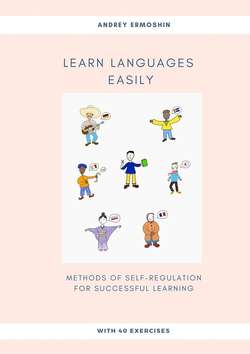Читать книгу Learn Languages Easily. Methods of self-regulation for successful learning - Андрей Ермошин - Страница 10
INTRODUCTION
Basic problems one encounters when learning a foreign language
Tensions and complexes acquired in the early stages of learning
ОглавлениеA bit of knowledge, but a lot of tension — this is a law of mental life. Our body has the following logic: “I don’t know what to do, but I hope that this energy outbreak will do the trick.” It is purely a reflex reaction. However, this energetic outburst will hardly compensate for the lack of experience! As a result, the student is sweating for no apparent reason. The only result it leads to is wasting energy, tiredness, and burnout. By the end of the class or some episode of interaction in a foreign language, beginners often say that they feel exhausted absolutely. Only the toughest can survive this challenge, and the majority tries to do everything they can to avoid the repetition of such unpleasant experience.
Even the subsequent increase of linguistic competence and constant practice do not set you totally free from this ‘primordial’ tension. This tendency occurs not only when learning a foreign language, but in any other sphere where one is supposed to improve their skills, like in sports.
Setting oneself free from the old blocks, calls for a specific effort. The case I am going to adduce further might play the role of the introduction to the following practice.
A young tennis player
Jane is a wonderful young tennis player. She is ten years old, and she has been playing tennis for five years. During the training, she shows a great game, but something happens to her during competitions. She gets upset because of mistakes and easily gives up in a peak situation.
I asked her if she had the information on how to win in tennis and where this knowledge was in her body.
“It looks like some light in my head,” answers Jane
“Where is the sensation that blocks your skills during the competition?”
“It’s in my chest. It’s stone the size of a fist.”
What can this “stone’ be? Most likely, this is fear, which appeared when Jane was only learning to play.
Anyway, she was now an experienced player!
Jane eagerly agreed, that the knowledge she had accumulated over these years of training, should be given more space so that it could spread over her body, and she had to let that “stone’ melt. She observed these two processes. Her knowledge spread, and the stone turned into streams of warmth that filled the body too: first, her hands, and then the rest of the body. A spot left by the stone quickly disappeared as well.
Then I asked her: “Could it be that there was some moment during the training when you got scared and felt lost?”
“Yes, there was such an episode.
“Where are the sensations connected with this experience?”
Jane discovered a black cloud in her stomach. This is how many people often describe the consequences of fright if they focus their internal vision on it. Soon, everything cleared up inside. Jane became even more relaxed and calm. Now, she imagined how, during the coming competition, she would easily, as a pro, show everything she had learnt while training.
Another aspect that required attention during our session with Jane was the sensation of some heavy burden on her shoulders, which was bothering her. It felt like bricks. Many people express their heightened sense of responsibility this way.
“Whose load is that? Is it yours or somebody else?” I ask her.
“It’s mine!” Jane says.
This is the pressure, which she experiences, but it is in her best interest to find the way to deal with it, even though it might seem like an unpleasant feeling. She observes how her body absorbs this heaviness. Jane throws back her shoulders and stands straight. Now, she even looks a bit more mature.
All this work took us about 20 minutes.
Since then, Jane has been playing with more confidence and freedom8.
Such sessions have been conducted with sportsmen of different training levels. Even the high-rank professionals need to work through their sensations to spread their experience on their body, to relieve the tensions and consequences of psychological traumas received during the training or competitions. Even after one session, the sportsmen acquire better mental strength. This is the key ingredient that leads to success.
It is always great to find out that two or three months later, these people have considerably improved their results and become champions.
Something similar should be done to our linguistic competence: we need to strengthen it, melt the tension associated with the learning process, and get rid of fears.
Fright is a variant of information trauma that may lead to a phobia. Getting rid of fear and tension is a necessary step to overcome a linguistic barrier.
8
This session took place on December 17 2010 in Odintsovo.
